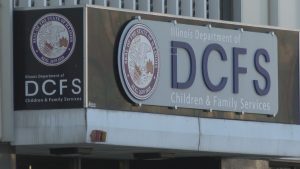SPRINGFIELD – As legislators returned to the Capitol this week, Senate Republicans set the tone with a press conference April 17 to advocate for various measures to improve Illinois’ economic growth and business climate.
In other news, the Illinois Senate and House of Representatives held a joint session to hear Chicago Mayor-elect Brandon Johnson promote his agenda and vision for the Windy City.
Meanwhile, the Department of Children and Family Services (DCFS) faced questioning in a Senate Appropriations hearing as the troubled agency continues to face serious challenges on keeping children safe.
Republicans Promote Business Agenda in Press Conference
State Sen. Jil Tracy (R-Quincy) says Illinois’ unfriendly business climate has pushed large companies to leave the state or significantly reduce their corporate presence. This week, several Senate Republicans promoted a package of business-centered legislation that will allow Illinois to improve its economic approach to businesses. The measures seek to help Illinois better compete, create jobs, and boost its economy.
Illinois is one of just 12 states that still has a state estate tax, and Sen. Tracy is sponsoring a measure to eliminate that tax and keep Illinois competitive with the 38 other states in the nation. Senate Bill 140 eliminates the state estate tax for persons dying on or after the effective date, or for transfers made on or after the effective date.

“Many of us were born and raised in Illinois and are proud to call it our home. It is no secret however, that Illinois is a state notorious for its tax burden on its residents, especially when compared to neighboring states,” Tracy said. “Illinois’ unfriendly business climate is the reason so many large companies are leaving the state or significantly reducing their corporate presence here. We need a business advocacy mindset with initiatives to help Illinois better compete, create jobs, and boost its economy.”
The 50th District Senator says the Illinois estate tax is imposed on a decedent’s estate before distribution to heirs. The amount of the tax is calculated after allowable deductions. The Illinois estate tax rate is graduated and goes up to 16 percent; however, it is only applied on estates worth more than $4 million.
“Generational businesses small and large, especially our farmers, are the bedrock of our economy. Years of hard work and dedication should not be penalized when a family member dies and the business is passed to other family members,” Sen. Tracy said. “A state estate tax punishes employers for building their businesses in Illinois instead of recognizing and rewarding their entrepreneurial spirit. It makes sense to join 38 other states and eliminate the state estate tax in Illinois.”
Senate Bill 140 awaits assignment to a Senate Committee for public hearing.

During the Capitol press conference April 17, the Senators highlighted Senate Bill 140 and other policy solutions aimed at attracting and retaining businesses and investing in communities:
Senate Bill 140: Eliminates the state estate tax for persons dying on or after the effective date, or for transfers made on or after the effective date.
Senate Bill 1406: Repeals the franchise tax that includes three different taxes on money used to build a business as opposed to revenue or net worth.
Senate Bill 1810: Removes the $100,000 cap on Net Operating Loss deductions to help businesses invest and grow their organizations without losing revenue to the state.
Senate Bill 2140: Reduces the filing fee for limited liability corporations by 50 percent.
Senate Bill 163: Creates a tax credit to fund research and development.
Senate Bill 2075: Creates a legacy tax credit for companies headquartered in Illinois and corresponding employee tax credits to support and retain Illinois’ legacy businesses.
Senate Bill 2084: Creates the Illinois Innovation Tax Credit.
Sen. Tracy says these proposals work to undo an unfortunate response to the defeat of the Progressive Income Tax in 2021 when the Governor and Majority Party passed a series of tax increases on Illinois businesses.
Chicago Mayor-Elect Johnson Delivers Speech to General Assembly
On April 19, the Mayor-elect of Chicago delivered a speech to a joint session of the Illinois General Assembly to tout his plans for the City. Mayor-elect Johnson made a lot of promises for programs that will likely be funded by businesses and could lead to the continued exodus of employers that Chicago has seen recently.
While no specific mention was made by Johnson on April 19, he has proposed a series of tax increases in recent months. Those proposals would be a direct hit to job-creators that not only employ thousands in the City but also the greater Chicagoland area. One such proposal would implement a hotel tax, which would stifle tourism and make it less attractive for visitors and major trade shows.
Instead of more tax-and-spend polices, Senate Republicans were hoping to hear the Mayor-elect present real, concrete plans and solutions to the crime problem facing Chicago. Rather than announcing how he intends to hold criminals accountable, Johnson glossed over the major issue that continues to receive negative headlines nationwide.
Sen. Tracy says that a vibrant and safe City of Chicago is vital to the economic well-being of Illinois, but she is concerned with the direction that the City has been heading in recent years.
DCFS Faces Questions During Appropriations Hearing

This week, legislators had a chance to question DCFS officials on the Department’s proposed budget for Fiscal Year 2024 during a Senate Appropriations committee hearing. DCFS funding has increased over the past few years, culminating in an increase of $767 million since Fiscal Year 2018.
Despite this increase, the number of child deaths under the Department’s radar has only increased in recent years. From Fiscal Years 2015 to 2018, an average of 100.5 children died per year, while from Fiscal Years 2018 to 2022, that number increased to an average of 129.5 children per year. In 2022 alone, there were 171 deaths of children who met the criteria for an investigation by DCFS.
Although funding has increased, DCFS has still failed to improve its quality of care for these vulnerable children. Instead, the issue has only worsened over time. And this is not the only issue that DCFS has faced. In the past few years, the Director of DCFS has faced multiple contempt of court charges over child placements and the Department has been accused of mishandling numerous cases.
Sen. Tracy says despite these disturbing trends, the Governor refuses to change DCFS leadership and instead continues to throw more money at the problem.
